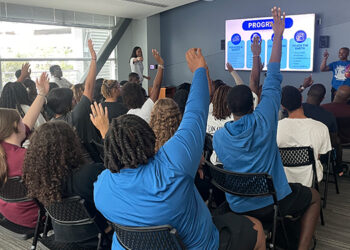
Outdoor leaders are attuned to pivoting. Regardless if it’s a change of plans due to weather or an equipment-related issue, they will adjust. And the coronavirus pandemic was another change they were not expecting. Below, two outdoor recreation leaders share their plans for getting back on track this fall.
Future Plans
At Red Rocks Community College, the fall semester will consist of remote, online and hybrid course options and the recreation center will be closed. Without face-to-face instruction, the Red Rocks Adventure Program will be minimal and heavily adapted based on CDC/state/college and outdoor industry guidelines.
Ben Wygant, the intramural and adventure coordinator at Red Rocks, said he hopes to offer several local day trips that follow social distancing, mask and hand washing protocols, and minimize the use of shared equipment.
“We’re also adapting our trip planning procedures, our emergency action plan (EAP), and our med kits to reflect pandemic considerations,” said Wygant. “We also plan to monitor regional hotspots and local hospital capacities in order to avoid overburdening health care systems in the event an evacuation is necessary. Our planning procedures will now include COVID-related guidelines on screening participants, including temperature checks, specific waiver language and symptom questionnaires. Our EAP will also include language on COVID-related procedures including more strict personal protective equipment precautions for emergencies, emergency services communication protocols and group management during incidents. Finally, our med kits will include as many masks, gloves, biodegradable soap and hand sanitizer as we can fit.”
Brandi Bates, the program coordinator for Ramble Outdoors at Loyola University Chicago said her team is also revamping to meet CDC and state guidelines. The current plan is to connect and empower students to use resources they can access.
“Ramble Outdoors is creating a Train to Trails resource so students can get to green spaces for hiking, paddling and biking, all while taking the L in Chicago,” said Bates. “We will offer a few times to go with a student facilitator, but we will also have it available on our website so students can go on their own. We are also planning online group development, kayaking on Lake Michigan, skill clinics called Wilderness Wednesdays and Campfires on the Quads — a social event for students to make s’mores at our firepit.”
Virtual Offerings
When it comes to virtual programming, Bates said this is a “must” for the process recreation is going through. Her team will not only be using it for group development and skills clinics, but also for student staff training. “Using social media will also help keep our students engaged,” she said. “This will be an effort with all of Campus Rec to ensure we are not competing within program areas.”
With the Red Rock’s facility being closed for the fall, Wygant said the majority of programming will be virtual and his team is currently facilitating a virtual Appalachian Trail hike, an outdoor summer bouldering series and a half marathon training group for students.
“Fall programs will hopefully include a social media adventure scavenger hunt, synchronous outdoor adventure experiences with challenges and debriefs, training clinics for rock climbers, camp cooking tutorials, and virtual forums with guest speakers,” shared Wygant. “We’re trying to gather as much student input as possible about programs and services that would be appealing in this format so we’re not just firing off programs into the ether.”
Gear Rentals
Gear rental for outdoor programming is one concern many students may have for being able to attend trips if they don’t have their own supplies and rely heavily on the rental programs many schools offer.
For Ramble Outdoors, gear rental will change to a no-contact pick-up, and videos of assembling and gear care will be provided. “We also reviewed our cleaning gear policies and procedures,” said Bates. “This mainly looks like keeping dropped off gear in a seven-day quarantine after moving it to a specified location with gloves and masks.”
Tips and Advice
As it was said before, outdoor leaders are attuned to transitions. And while this transition can be frustrating and scary, Bates also views it as a chance for growth. “Something that helps these transitions for me is getting creative, connecting with others such as colleagues in the field, student staff and colleagues in a different outdoor realm — and a good laugh.”
Wygant also agreed this time is a great opportunity for growth and a chance to strip programs down to the essentials, asking the questions:
- Why do we lead outdoor programs?
- What is the point?
- What impact are we trying to affect in our students?
“Once we’ve removed everything that isn’t essential, then we can rebuild outdoor programming around this weird new reality,” said Wygant. “As outdoor professionals, our adaptability is our strength. If we can build an arm splint out of a stale baguette, or teach mountain weather with a trash bag and a sleeping pad, we can do this, too.”










